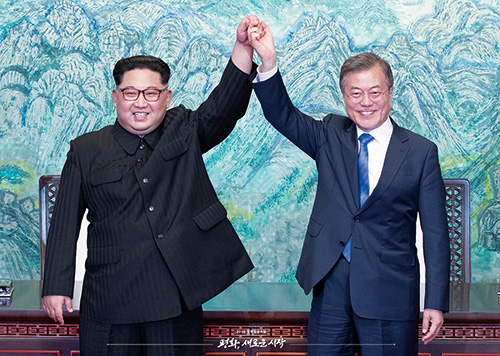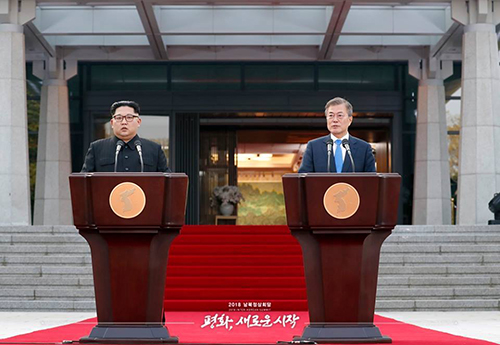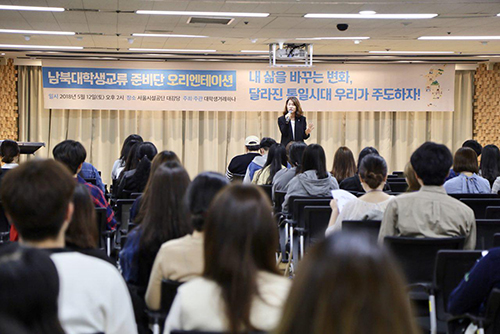Moon and Kim declared new era of peace starting from Panmunjom
 President Moon Jae-in and the North Korea leader Kim Jong-un are holding their hands up high after they signed the Panmunjom Declaration for Peace, Prosperity and Unification. /Photography from the Blue House (Cheongwadae) |
On April 27th, the day of the Inter-Korean Summit, about three thousand reporters from 37 countries visited the press center at KINTEX. Crowds of the reporters broadcasted it live and wrote articles. To make this impressive summit come true, South and North Korea had to go through a lot of obstacles. For a decade, the relationship between the two countries can be described as a confrontation and it could not have been worse. However, after President Moon Jae-in was elected, the atmosphere started to reverse rapidly. From the unified Korean ice hockey team in the PyeongChang 2018 Olympic Winter Games to the Inter-Korean Summit, a lot of changes turned up within South Korea and also worldwide. Then, along with the hardships, what is happening and what alterations are appearing all over the world in recent days?
The beginning of peace: Inter-Korean Summit
To successfully hold the Inter-Korean Summit, on March 5th, South Korea sent five envoys to the North including Chung Eui-yong, the Director of the National Security Office and Seo Hoon, the head of the National Intelligence Service. While they had a meeting with the North Korea leader, Kim Jong-un, they set the schedule of the Korea Summit and also grasped at denuclearization. Accordingly, on April 27th, the North Korea leader visited the South for the first time. At the Panmunjom, the two leaders declared that there will be no more war in Korean Peninsula and an era of peace has just begun.
The key points of the Panmunjom Declaration were the common goal of denuclearization, trilateral (two Koreas and the United States) or quadrilateral meeting (two Koreas, the United States, and China) to declare the end of the Korean War this year, and the promotion of the peace treaty.
However, the trilateral or quadrilateral meeting is not intended for delivering the results of the Panmunjom Declaration to related countries. In fact, South Korea does not have the authority to end the war since South Korea refused to sign the Korean Armistice Agreement at that time. Only with the signatures of the United States, North Korea, and China, the war can be ended. Thus, this Inter-Korean Summit, also called the Panmunjom Declaration, is a “symbolic” end of war, not an “actual” end of war.
After the Korea Summit, both South and North Korea took actions to implement the declaration. The first one was to tear down the loud speakers which broadcasted propaganda for 55 years, installed in May of 1961. As the loud speakers’ role was to slander each other, this movement was the first proper step of encouraging the atmosphere of cooperation. Furthermore, the North and the South finally decided to use the same time zone. Although the two Koreas and Japan used to be in the same time zone, North Korea suddenly changed its time three years ago in the name of getting rid of the vestiges of Japanese imperialism. However, according to the announcement from the Blue House (Cheong Wa Dae), during the private talk they had between official talks, Kim said, looking at the clock, “It hurts my feeling to see the time difference.” Therefore, from May 5th, North Korea changed the time zone back thereafter.
Denuclearization, which receives attention the most, is going ahead, too. On May 24th, the nuclear testing ground in Punggye-ri shut down in front of 31 reporters from five countries including China, Russia, the United States, the United Kingdom, and South Korea. The past Inter-Korean Summits such as the 6.15 declaration and the 10.4 declaration were not able to stand long. Not to repeat the same mistake over again, the government demanded to adopt the resolution of the support of declaration, so it can have legal effect and last for a long time. Unfortunately, in the National Assembly plenary session on May 28th, adopting the resolution foundered due to disagreements on contents. In addition to these changes, the South and the North still have a long way to go to carry forward the declaration while overcoming a lot of surrounding obstacles.
 President Moon Jae-in and the North Korea leader Kim Jong-un are holding their hands up high after they signed the Panmunjom Declaration for Peace, Prosperity and Unification. /Photography from the Blue House (Cheongwadae) |
Related matters of Korea Summit are not limited to the two Koreas
The Inter-Korean Summit attracted global attention, and in particular, the United States and China, countries directly involved with the Korean War, are showing active attitudes. Until recent days, the conflict between the United States and North Korea continued with an issue “denuclearization.” For this reason, Donald Trump, the President of the United States of America, is now playing a central role by showing unpredictable conducts. After Panmunjom Declaration, the United States-North Korea Summit was settled for June 12th in a peaceful atmosphere. However, President Trump once announced the cancellation of the summit and gave a big shock throughout the world. Taking this opportunity, the South and North Korea had the second meeting to discuss precarious the United States-North Korea Summit.
Also, the two leaders promised again to perform the Panmunjom Declaration speedily. Afterwards, the United States and North Korea resumed the negotiations for the upcoming summit scheduled in June. The animated working-level talks are taking place in both Singapore and Panmunjom to discuss agendas and protocol. An American student of Dongguk University showed quite a negative view saying, “I hope this summit goes smoothly and Trump does not ruin the situation. I doubt, however, that his cabinet members would allow such a ‘thing’ to happen.”
Moreover, the possibility of awarding the Nobel Peace Prize to Trump is becoming a hot topic worldwide. Some say he is likely to get the prize but some criticize that he is not suitable for it. The American student added, “After he was elected, there was an increase in hate crimes all over America because American citizens saw how he spoke and acted. Why should someone who caused this situation receive an award that is the exact opposite of what he has projected?”
On the other hand, China is having a somewhat different problem from the United States. As stated above, according to the Panmunjom Declaration, trilateral (two Koreas and the United States) or quadrilateral meeting (two Koreas, the United States, and China) might take place this year. This means China’s participation for the summit is optional. At the time when China signed for the Korean Armistice Agreement, they signed in the name of the Chinese People’s Volunteer Army (PVA), which is not an official army. China’s official army is called the People’s Liberation Army (PLA). There is a different view that whether the PVA can really represent China or not. Koh You-hwan, the professor of the North Korean Studies Major, said “It seems that the two Koreas and the United States prefer to declare the end of the war themselves. I think if China wants to participate in the summit, the four countries would conclude a peace treaty after the end of war.”
Of course, it is impossible to leave the role of the United States and China out of consideration. They actually have big influence whether it is good or not. Though, we must think what we should focus on to make lasting peace in Korea. Now, the world is overly focused on political issues, but these circumstances do not go along with the word “stable” which might be the key to real peace.
 President Moon Jae-in and the North Korea leader Kim Jong-un are holding their hands up high after they signed the Panmunjom Declaration for Peace, Prosperity and Unification. /Photography from the Blue House (Cheongwadae) |
There is a transition in perception among the youth
According to the report distributed by the Ministry of Unification, in the past, there was an increase in awareness of considering North Koreans as enemies. The survey of the report shows that in 2005, 15 percent of citizens had such a view. Surprisingly, the proportion increased rapidly up to 41 percent in 2015. However, after the 2018 Inter-Korean Summit, a dramatic change took place. The survey about the necessity of unification by KBS Broadcast Research Institute illustrates that 44.6 percent of people are positive about the unification. Also, 30.9 percent showed a strong urge to it. About three fourths of people agreed to the necessity of unification. Unlike the past, when half of the people used to have hostility to North Koreans, now people’s attitude has changed, and stressed the essentiality of unification.
With this wave, some university students started to reply to the mainstream. The South-North Korean University Students Interaction Ready Group (Ready Group) has been formed right after the 2018 Inter-Korean Summit. They are going to do activities such as planning and preparing for the actual interaction between the youth of the South and the North. Additionally, lectures by some experts about the matter of the North and the South’s history are scheduled.
Jung Chul-woo, the Chief of the Ready Group, mentioned, “We are aiming to lead the new era of peace and reunification. We hope to be the main agent of this society.” The South and the North finally declared to end the war. Regarding this, he explained, “We proclaimed ourselves not to go back to the unfortunate past. However, our life did not change much. Those changes were intangible. So, we thought we needed to take action.” Furthermore, he added, “With 200 university students, we will proceed a campaign to support the ‘Panmunjom Declaration.’ Of course, since we are at the foundation level, the range did not expand to the public. Nevertheless, with our efforts, we will obviously make it. Later, I assume that we might actually be the first ones to visit Pyeongyang.”
Legitimate way for unification: alleviating human rights
A documentary, “The Jangmadang Generation,” shares the thoughts of the millennial generation of North Korea. It portrays how some North Koreans were able to watch K-dramas and encounter to capitalism. One of the defectors from the documentary stresses that North Koreans are also people, just like the others. In this regard, Sokeel Park, the South Korea Country Director of Liberty in North Korea and producer of the documentary, elucidated that “It illustrates why and how the millennial generation, so called the urban generation, changed. They have been exposed to capitalism more than their previous generation did. With this remarkable change, they are prepared to go through the process of change.”
“The Jangmadang Generation” is one of the “changing the narrative” projects. He explained, “When we think of North Korea, we usually come up with political issues, such as security, nuclear bombs, and Kim Jong-un.” However, he pointed out that this is not a right way to do so. He stressed that, “We need to shift the framework to people. We should no longer regard North Korea as a threat of the war. We should try to fix the fundamental problem, human rights condition. Also, going through the process of accepting them as ‘us,’ the range of human rights should not be only limited to banning political prison camps. We should widen its range to categories such as free to move, free to pursue occupation, and free to travel.”
The investment truly understanding the North is needed
Also, another fundamental settlement is needed in universities. Nowadays only few universities provide North Korean Studies courses. Most of the universities went through the restructuring process. For instance, Chosun University, and Catholic Kwandong University removed North Korean Studies. Similarly, Myoungji University has merged it to the Department of Political Science and Diplomacy. Likewise, among those few universities which offered North Korean Studies Major, only Dongguk University is barely keeping North Korean Studies Major in existence.
There seems to be a paradox between the path of the government and universities. Now, the government tries to pursue a peaceful atmosphere and even unification. However, contrary to the effort of the current government, there is not enough investment made for North Korean Studies.
Kim Kyu-jin, the Chairperson of North Korean Studies Major, delivered his opinion saying, “A lot of universities had to shut down North Korean Studies courses because of unemployment issue. However, universities should not be operated with the logic of a company. I hope schools no longer manage departments or studies with a business owner’s mindset.” He added, “For a few years, there were no transfer students from other universities. Whether it is the impact of the 2018 Inter-Korean Summit, it is true that the demand of North Korean Studies Major is increasing. Contrary to the demand, there are only three professors who are in charge of North Korean Studies Major. With professors heading to their retirement, the future of the major is unclear. So, to ameliorate this situation, we are trying our best for fulfillment of the professors and courses.”
The 2018 Inter-Korean Summit has received a lot of attention world-wide. It has influenced on not only Koreans, but also the world. Now, although the Korean peninsula has the pain of division, some hope for peaceful atmosphere arose. Yet, with these attentions, discreet cautions should be considered. South Korea Country Director Park spoke, “In order to have peace in the Korean peninsula, what is needed is not a peace treaty for denuclearization. The fundamental settlement for this is to have steady efforts for people. We need to make better interaction with people in North Korea. In the international community, we do not consider them as a ‘broken’ family, whose members in separate places all over the world. The broken families are results of the closed country, not the division of the peninsula.”

